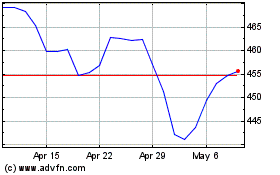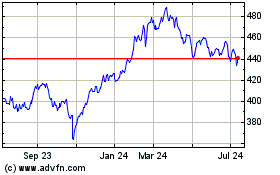Facebook Scrambles to Keep Libra on Track as Partners Waver -- 2nd Update
October 01 2019 - 7:08PM
Dow Jones News
By AnnaMaria Andriotis and Peter Rudegeair
Cracks are forming in the coalition Facebook Inc. assembled to
build a global cryptocurrency-based payments network.
Visa Inc., Mastercard Inc. and other key financial partners that
signed on to help build and maintain the Libra payments network are
reconsidering their involvement following backlash from U.S. and
European government officials, according to people familiar with
the matter. Wary of attracting regulatory scrutiny, executives of
some of Libra's backers have declined Facebook's requests to
publicly support the project, the people said.
Their reluctance has Facebook scrambling to keep Libra on track.
Policy executives from Libra's more than two dozen backers -- a
group called the Libra Association -- have been summoned to a
meeting in Washington, D.C., on Thursday, according to people
familiar with the matter.
On Oct. 14, representatives from the companies are slated to
meet in Geneva to review a charter for the Libra Association and
appoint a board of directors, according to a memo reviewed by The
Wall Street Journal.
Major defections could imperil Libra, Facebook's audacious
attempt to convince consumers to swap their national currencies for
a digital coin that could be used to pay for goods and services on
the internet. Without a network of financial partners that could
help transfer currencies into Libra and global retailers to accept
it as a form of payment, Libra's reach would be limited.
When it unveiled the project in June, Facebook said Libra could
change the entire financial system, giving consumers a whole new
way to move money across borders. The project's backers saw the
effort as a long-shot way to profit on Facebook's 2.4 billion
monthly active users.
After watching popular social-media company Tencent Holdings
Ltd. come to dominate the market for Chinese digital payments with
WeChat Pay, some payments companies agreed to take part in Libra to
avoid missing out on the next big thing.
Facebook, which worked in secret for more than a year to develop
Libra, has broad ambitions for the project as part of a shift away
from its nearly complete reliance on targeted advertising.
Facebook Chief Executive Mark Zuckerberg is steering the
social-media giant to more private and encrypted communications,
and Libra could offer a means of providing financial services
through those channels.
In announcing the project in June, the company said it hoped to
provide basic financial services to people around the world who
lack bank accounts and to save some of the $25 billion "lost by
migrants every year through remittance fees."
Some analysts have been bullish that Libra could help Facebook
diversify its revenue base and potentially transform the digital
consumer economy over the long term.
Yet government officials and central bankers were quick to
criticize the project, citing concerns about how the network would
protect users' privacy and prevent criminals from using it to
launder money.
David Marcus, the Facebook executive in charge of the project,
endured two days of tongue-lashings from members of Congress over
the summer for the lack of details about how the new cryptocurrency
would work as well as the company's past missteps on data privacy.
Federal Reserve Chairman Jerome Powell told legislators he had
"serious concerns" about Libra and its timetable of launching next
year.
Privately, U.S. regulators have leaned on Libra's backers. The
Treasury Department sent letters to companies including Visa,
Mastercard, PayPal Holdings Inc. and Stripe Inc. asking for a
complete overview of their money-laundering compliance programs and
how Libra will fit into them, people familiar with the matter
said.
Libra Association members, meanwhile, have been pressing
Facebook for more information. They have asked Mr. Marcus and other
Facebook executives how illegal activities such as money laundering
and terrorist financing would be kept off Libra and haven't
received detailed answers, one of the people said.
It is unclear how many of the initial Libra Association members
ultimately will commit to the network. So far, members have signed
nonbinding letters of intent, and they haven't yet handed over the
$10 million that Facebook requested from each member to fund the
creation of the coin and build out the network, people familiar
with the matter said.
"It's important to understand the facts here and not any of us
get out ahead of ourselves," Visa Chief Executive Al Kelly said on
the company's earnings conference call in July. "No one has yet
officially joined."
Write to AnnaMaria Andriotis at annamaria.andriotis@wsj.com and
Peter Rudegeair at Peter.Rudegeair@wsj.com
(END) Dow Jones Newswires
October 01, 2019 18:53 ET (22:53 GMT)
Copyright (c) 2019 Dow Jones & Company, Inc.
MasterCard (NYSE:MA)
Historical Stock Chart
From Mar 2024 to Apr 2024

MasterCard (NYSE:MA)
Historical Stock Chart
From Apr 2023 to Apr 2024
